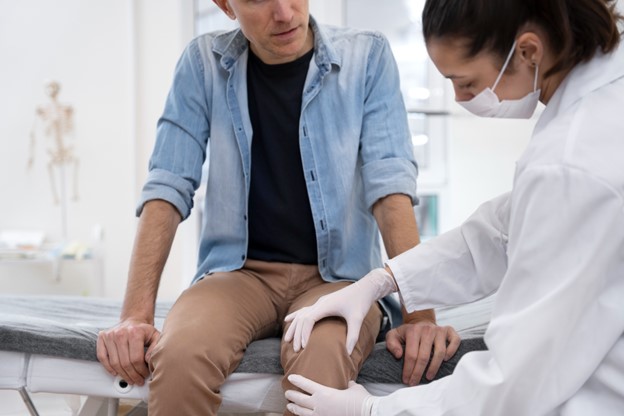Knee pain can severely affect your daily life, making even simple tasks like walking or climbing stairs difficult. For those suffering from severe knee arthritis or joint damage, Total Knee Replacement (TKR) surgery may be the solution.
What is Total Knee Replacement (TKR)?
Total Knee Replacement, or TKR, is a surgery where the damaged parts of the knee joint are replaced with artificial components. The knee joint is made up of the femur (thigh bone), tibia (shin bone), and patella (kneecap). When these parts become worn out due to arthritis or injury, TKR can help relieve pain and improve function.
Why is TKR Needed?
TKR is often recommended when other treatments, like pain medications or physical therapy, no longer work. Common conditions that lead to TKR include:
- Osteoarthritis: The most common cause of knee pain, where the cartilage wears away, causing bone-on-bone friction.
- Rheumatoid Arthritis: An autoimmune condition that causes joint inflammation.
- Injury: Previous knee injuries or fractures that result in arthritis or deformity.
- Severe Knee Deformities: When the knee joint becomes misaligned, causing pain and difficulty moving.
How is TKR Performed?
TKR surgery is done under anesthesia and typically takes a few hours. The surgeon removes the damaged parts of the knee joint and replaces them with artificial components made of metal, plastic, or ceramic. The surgery is followed by closing the incision, and a careful post-surgery plan is put in place to ensure a smooth recovery.
Benefits of TKR
- Pain Relief: TKR can eliminate the chronic pain caused by knee arthritis.
- Improved Mobility: The surgery restores your ability to move more freely, allowing you to do daily activities like walking, climbing stairs, or even exercising.
- Better Quality of Life: TKR can significantly improve your overall quality of life, helping you return to the activities you love.
- Long-Term Results: With proper care, the artificial knee joint can last for many years.
What to Expect After Surgery
Recovery after TKR takes time, but with the right care, you can expect to see significant improvements.
- Hospital Stay: You will stay in the hospital for 2-3 days after the surgery.
- Physical Therapy: Our physiotherapists will guide you through exercises to strengthen the knee and restore movement.
- Pain Management: We’ll help you manage any discomfort through medication and other methods.
- Gradual Return to Activities: Most patients can return to normal activities within 3 to 6 months, with full recovery taking up to a year.


